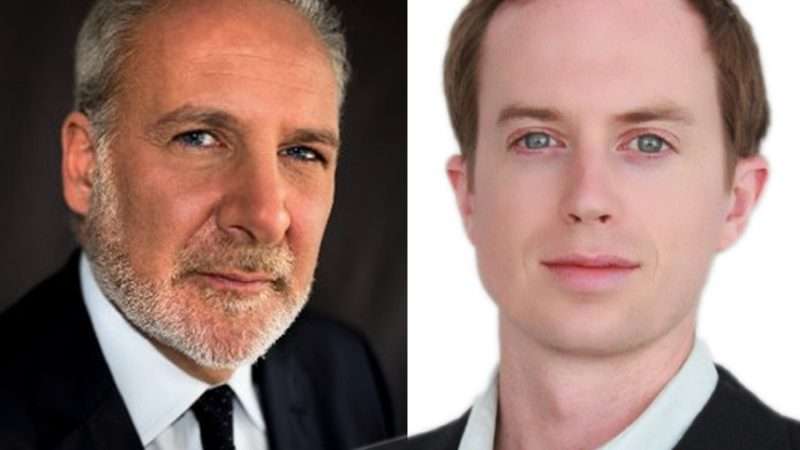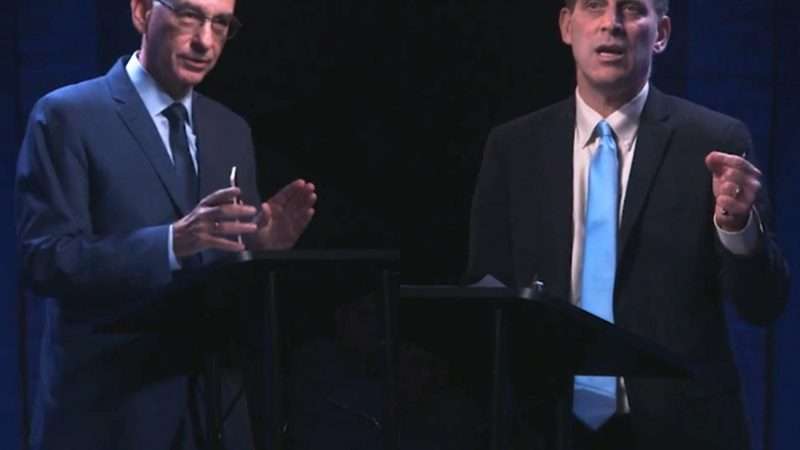
Is Bitcoin the Future of Money? Peter Schiff vs. Erik Voorhees
07/19/18 • 82 min

On July 2, 2018, Reason and The Soho Forum hosted a debate between Erik Voorhees, the CEO of ShapeShift, and Peter Schiff, CEO and chief global strategist of Euro Pacific Capital.
The proposition: "Bitcoin, or a similar form of cryptocurrency, will eventually replace governments' fiat money as the preferred medium of exchange."
It was an Oxford-style debate in which the audience votes on the resolution at the beginning and end of the event, and the side that gains the most ground is victorious. Voorhees won by changing the minds of 15 percent of attendees.
The Soho Forum is held every month at the SubCulture Theater in Manhattan's East Village. At the next debate, which will be held on August 27, William Easterly, professor of economics at NYU, and Joseph Stiglitz, a Nobel Prize Winner in economics and professor at Columbia, will discuss whether free markets or government action is the best way to eliminate global poverty. You can buy tickets here.
Produced by Todd Krainin.
Subscribe to our YouTube channel.
Subscribe to our podcast at iTunes.
The post Is Bitcoin the Future of Money? Peter Schiff vs. Erik Voorhees appeared first on Reason.com.

On July 2, 2018, Reason and The Soho Forum hosted a debate between Erik Voorhees, the CEO of ShapeShift, and Peter Schiff, CEO and chief global strategist of Euro Pacific Capital.
The proposition: "Bitcoin, or a similar form of cryptocurrency, will eventually replace governments' fiat money as the preferred medium of exchange."
It was an Oxford-style debate in which the audience votes on the resolution at the beginning and end of the event, and the side that gains the most ground is victorious. Voorhees won by changing the minds of 15 percent of attendees.
The Soho Forum is held every month at the SubCulture Theater in Manhattan's East Village. At the next debate, which will be held on August 27, William Easterly, professor of economics at NYU, and Joseph Stiglitz, a Nobel Prize Winner in economics and professor at Columbia, will discuss whether free markets or government action is the best way to eliminate global poverty. You can buy tickets here.
Produced by Todd Krainin.
Subscribe to our YouTube channel.
Subscribe to our podcast at iTunes.
The post Is Bitcoin the Future of Money? Peter Schiff vs. Erik Voorhees appeared first on Reason.com.
Previous Episode

Has the U.S. Constitution Lost Its Meaning? A Debate

Should the U.S. Constitution be interpreted and applied according to the original meaning of its text?
On June 11, 2018, two leading constitutional legal scholars, Georgetown's Randy Barnett and Cornell's Michael Dorf, debated "originalism," which seeks to protect against arbitrary and personal interpretations by jurists, while making the law stable, predictable, and consistent in its application.
The debate was hosted by Reason and the Soho Forum, which runs Oxford-style debates, in which the audience votes on the resolution at the beginning and end of the event, and the side that gains more ground is victorious. The resolution was: "The U.S. Constitution should be interpreted and applied according to the original meaning communicated to the public by the words of the text."
Dorf won the debate by changing the minds of 20 percent of the attendees.
Barnett, arguing for the affirmative, is the Carmack Waterhouse Professor of Legal Theory at the Georgetown University Law Center and the director of the Georgetown Center for the Constitution. His books include Our Republican Constitution: Securing the Liberty and Sovereignty of We the People and Restoring the Lost Constitution: The Presumption of Liberty. After taking a J.D. from Harvard Law School, he worked as a prosecutor in Chicago. Barnett is a Senior Fellow of the Cato Institute and the Goldwater Institute.
Dorf, for the negative, is the Robert S. Stevens Professor of Law at Cornell University Law School. He is the editor, author, or co-author of six books, including On Reading the Constitution, with co-author Laurence Tribe. Since 2000, Dorf has written a bi-weekly column, currently appearing on Justia's Verdict. He also posts less formal legal analysis several times per week on his blog, Dorf on Law. After taking a JD from Harvard Law School, he served as a law clerk for Judge Stephen Reinhardt of the United States Court of Appeals for the Ninth Circuit and then for Justice Anthony Kennedy of the Supreme Court of the United States.
The event opened with a standup routine from comedian Dave Smith.
The Soho Forum is held every month at the SubCulture Theater in Manhattan's East Village. The next debate, which is sold out, features Erik Voorhees and Peter Schiff on bitcoin and crypotcurrency. On August 27, William Easterly and Joseph Stigli...
Next Episode

Can the Free Market End Global Poverty? Nobel Laureate Joseph Stiglitz vs. NYU's William Easterly
There has been a staggering reduction in global poverty over the last four decades. In China, sustained rates of economic growth have lifted 800 million people out of extreme poverty. Ethiopia, a country once synonymous with famine, has grown faster than China while nearly halving its poverty rate over the last 15 years. Across the planet, developing countries large and small, from India to Ghana, have seen astonishing successes in alleviating poverty, exceeding even the most optimistic economic forecasts.
How did this extraordinary shift happen? Do poor countries need more markets, or more government?
Two of the world's best-known development economists, Joseph Stiglitz and William Easterly, met on August 27, 2018, at the SubCulture Theater in Manhattan's East Village to debate these questions. The event was sponsored by the Soho Forum, a monthly debate series partnered with Reason. Soho Forum Director Gene Epstein moderated.
Stiglitz, a Nobel laureate and former chief economist of the World Bank, is a professor at Columbia University. He credits thoughtful and aggressive government intervention for the rising fortunes of China and Ethiopia. In his view, markets are a tool to stimulate economic growth—but not always the most effetive one. "You always are going to have a mixture of governments and markets," he says. "And the only success is going to be where you get the right mixture."
Easterly is a professor of economics at New York University and a senior fellow at the Brookings Institution. He argues that China only achieved stellar growth rates after the Communist Party started to recede from economic life and created a space for markets to thrive. Likewise, Ethiopia prospered only after the disintegration of a repressive Communist regime, known as the Derg, paved the way for widespread privatization of industry and commerce.
Produced by Todd Krainin.
Visit the archive of past Soho Forum events.
To listen to an audio podcast version of the Soho Forum, subscribe to the Reason Podcast at iTunes.
Subscribe to our YouTube channel.
The post Can the Free Market End Global Poverty? Nobel Laureate Joseph Stiglitz vs. NYU's William Easterly appeared first on Reason.com.
If you like this episode you’ll love
Episode Comments
Generate a badge
Get a badge for your website that links back to this episode
<a href="https://goodpods.com/podcasts/the-soho-forum-debates-180954/is-bitcoin-the-future-of-money-peter-schiff-vs-erik-voorhees-15868880"> <img src="https://storage.googleapis.com/goodpods-images-bucket/badges/generic-badge-1.svg" alt="listen to is bitcoin the future of money? peter schiff vs. erik voorhees on goodpods" style="width: 225px" /> </a>
Copy




